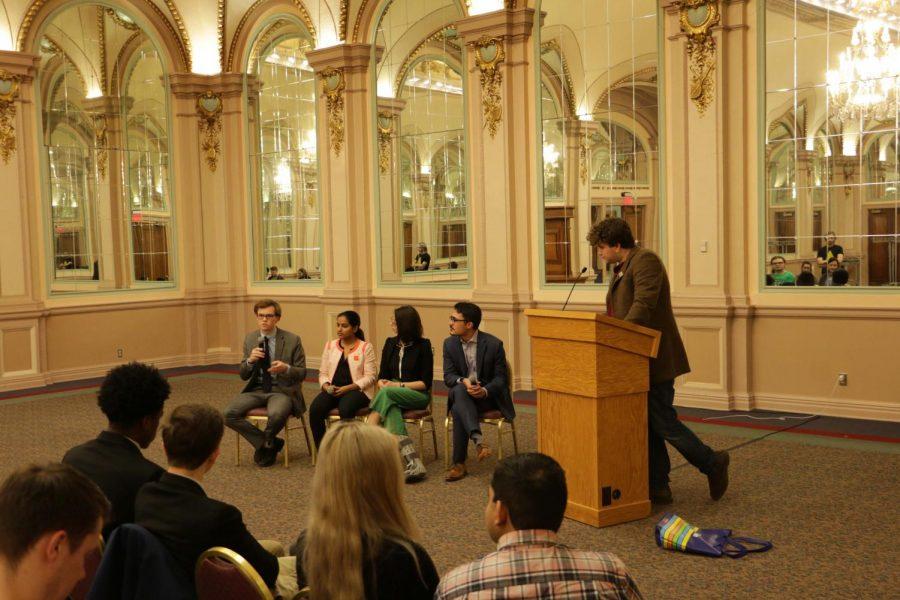2020 SGB candidates discuss platforms
Nate Kohler | Staff Photographer
SGB election slates, in addition to one single candidate, met on Wednesday night to hold a Meet the Candidates event hosted by Andrew Dow, a senior communication major. SGB voting will begin Feb. 25 at 8am.
February 6, 2020
What do Beyoncé, Starship robots and celebrity crushes all have in common? All of them were topics of debate for Student Government Board candidates at Wednesday’s Meet the Candidates event.
Election slates, in addition to one single candidate, met in the William Pitt Union Ballroom at the event hosted by Pitt Tonight’s Andrew Dow.
Election slates are groups of two, three or four students that run for SGB. Both four-candidate slates, the Voices slate and Yourslate, running in the 2020 SGB election are headed by students running for president of SGB. On Feb. 17, Eric Macadangdang and Ravi Gandhi will have a one-on-one debate focused specifically on the presidential election.
The Pitt student body will elect one SGB president and eight board members from the group. Voting will take place on Feb. 25, beginning at 8 a.m.
During the talk show-style event, Dow interviewed slates about SGB allocations, mental health resources and interconnectivity between organizations on Pitt’s campus, as well as a few more lighthearted questions designed to test how candidates react under pressure.
Eric Macadangdang, a junior SGB board member majoring in urban studies and history and philosophy of science, is the presidential candidate for the Voices Slate. The slate includes Kathryn Fleisher, a junior majoring in politics and philosophy and gender, sexuality, and women’s Studies, Annalise Abraham, a sophomore focusing on environmental studies and Ben King, current chair of the allocations committee and junior political science and communication major.
According to Macadangdang, the slate aims to give a voice to every student organization on campus, allowing them more direct say in how resources are allocated.
The Voices slate members emphasized their intent to adjust the purpose of SGB, specifically focusing on the right of student organizations to have clear and open communication with the University’s administration.
“We need to bring the focus back to representing students on issues people care about, like tuition and housing, and then the things we directly control which is the student activities fund,” King said.
Macadangdang also related Voices to a broader definition of SGB’s purpose, describing it as a voice for the Pitt student body.
“We understand that 18,000 students are crushed by debt, who are facing food insecurity, facing mental health issues, facing sustainability issues on a dying planet have the right to demand the change we want to see on campus and we believe student government can make that change,” Macadangdang said.
Aman Reddy, a junior microbiology major, is running for a board position and is the only individual candidate not running as part of a slate in the 2020 SGB election.
Reddy’s platform for SGB is primarily centered on improving the ease of Pitt student’s access to transportation, technology and health services.
A large part of Reddy’s plan to make life easier for students focuses on optimizing transportation services for students living off campus. He would like to add more parking spaces and work with Port Authority to rearrange bus timetables.
Reddy also emphasized the need for students to have easy access to therapists and doctors.
“While the University is making attempts to improve its resources, some of these seem a bit too superficial,” Reddy said. “We need resources to come to Pitt instead of students going out of their way to seek them out.”
Launch is a two person slate consisting of Tyler Viljaste, a sophomore politics and philosophy and finance major and the current community and governmental relations chair on SGB, and Cedric Humphrey, a junior SGB board member and liaison to the judicial committee who is majoring in political science.
Viljaste explained the rationale behind the name Launch, stressing his intention for SGB to refocus on student’s futures. He emphasized how for many students, college education is the start of a lifelong career and he wants SGB to help remove obstacles students may face in achieving that future.
Viljaste is a member of the Pitt fraternity Beta Theta Pi. At the beginning of Launch’s portion of the event, Viljaste explained that he would personally like to see SGB work on reforming Greek life’s reputation among the administration and student body.
According to Viljaste, he would like to see more recognition for the charities that Greek organizations contribute to, as well as the positive effect they can have on members’ productivity and social health.
“I think it’s extremely important to have someone on board who is an active member of Greek life and who is all for affirming the positive aspects of Greek life because without that strong presence nothing is going to change,” Viljaste said.
Gandhi, a junior majoring in mechanical and electrical engineering and the diversity and inclusion committee chair, is the presidential candidate for Yourslate. He is running for the board alongside Victoria Chuah, a junior majoring in computer science.
Yourslate’s main goals include improving resident life for students living on campus by creating better disability accommodations and services. Additionally, the slate is planning to create more promotions for arts students, a group they said was underrepresented in University social spaces.
According to its members, Yourslate is primarily focused on creating a SGB board comprised of students from different schools, majors, interests and walks of life in order to ensure SGB establishes open communication with all facets of University life.
“[It] is called Yourslate because it’s really all about you … in an urban campus that’s inherently decentralized it’s really the student government’s responsibility to connect all the different organizations,” Gandhi said.








